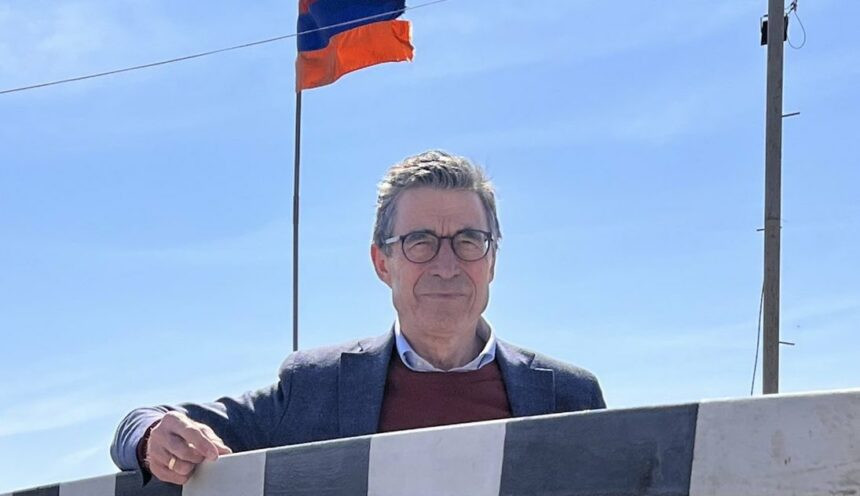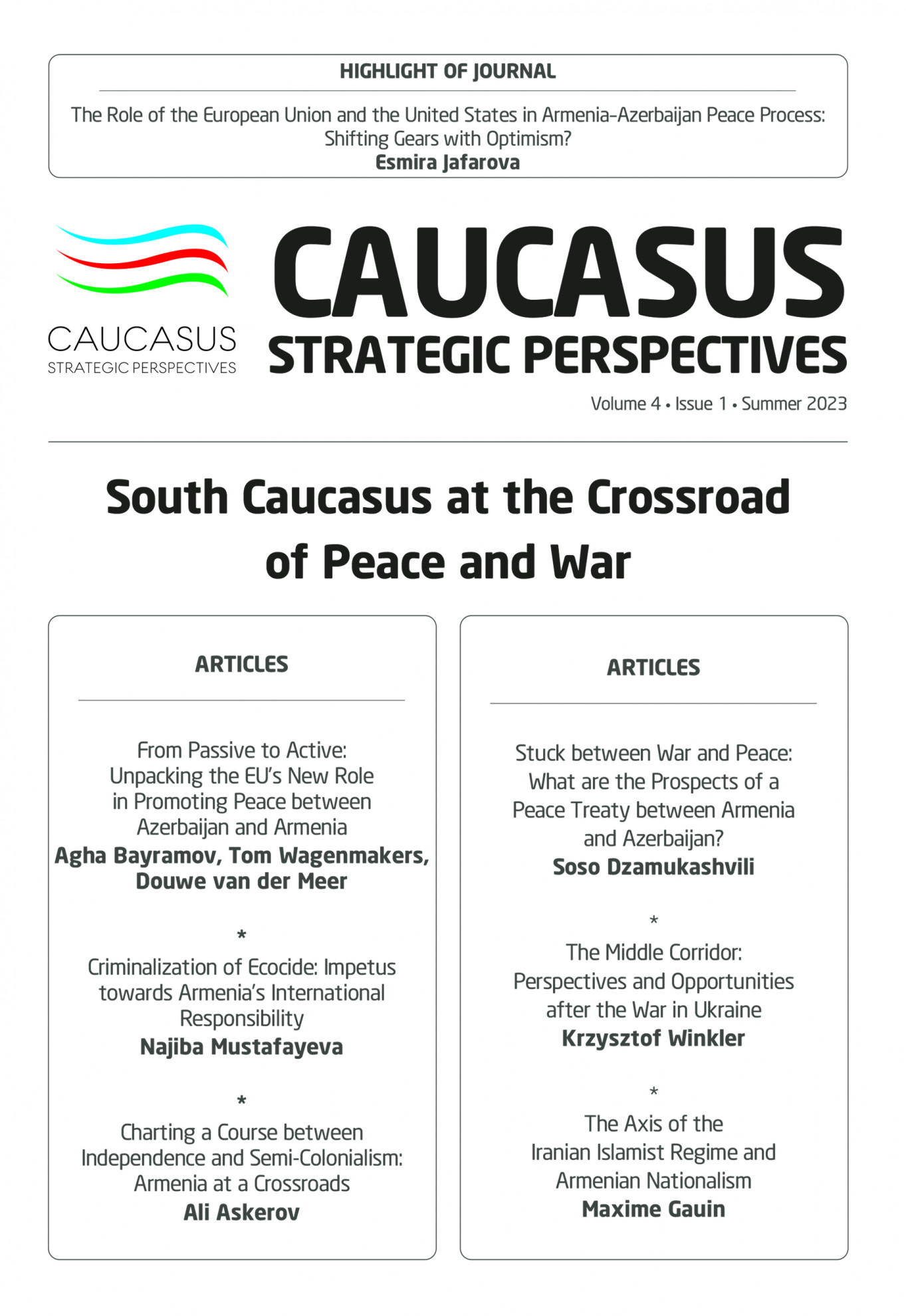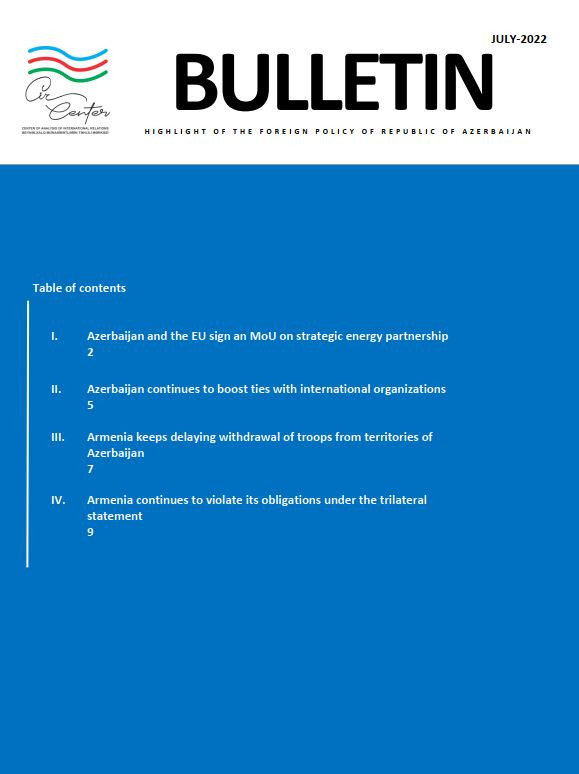This piece is a response to the article by the former NATO Secretary General (SG) Anders Fogh Rasmussen, titled “The Other Conflict on Europe’s Doorstep” and published by the Project Syndicate on March 24, 2023. In his article former NATO SG hurls unfounded accusations against Azerbaijan for the so-called “blockade” of the Lachin road and violating its commitments under the November 10, 2020, Trilateral Declaration.
Lachin district was returned to Azerbaijan after the 44-day Karabakh War in 2020 in accordance with the paragraph 6 of the Trilateral Declaration of November 10, 2020 signed by the leaders of Azerbaijan, Armenia and the Russian Federation that ended a 30 year-long Armenian occupation of the internationally recognized territories of Azerbaijan. Article 6 of the Trilateral Declaration subsequently states: “The Republic of Azerbaijan shall guarantee the safety of citizens, vehicles, and goods traveling along the Lachin corridor in both directions” and Azerbaijan indeed abides by its obligation to ensure the safety of people and vehicles traveling along the Lachin Road connecting Armenia to Karabakh since the end of war in 2020 till today. However, what Azerbaijan did not agree to and neither it was enshrined in the November Trilateral Declaration, was that Lachin Road be exploited beyond civilian and humanitarian purposes.
According to Article 4 of the Trilateral Declaration, “The peacekeeping contingent of the Russian Federation shall be deployed in parallel with the withdrawal of the Armenian armed forces”. Nonetheless, the Armenian side persistently refuses to withdraw the remnants of its armed formations from the Azerbaijani lands in violation of the November 2020 declaration. Moreover, by arming its military units therein via the Lachin road Armenia further escalates the situation and defies the chances for peace. Unfortunately, Armenia abuses the Lachin Road for the military supply and sustenance of its troops and for instigating more sabotage and subversion against Azerbaijan.
Thus, in flagrant violation of the document, Lachin road has also been consistently misused for the illegal trafficking of Azerbaijan’s natural resources extracted from Gizilbulag and Demirli gold and mineral deposits that have illegally been exploited over a very long time. Previously, Azerbaijan has sent warnings to the Armenian side to stop the illegal mining of these deposits, which sadly went unheeded. Since December 12, 2022 Azerbaijani people represented by the eco-activists, NGOs, students, teachers, representatives of the civil society and many others from all walks of life have been peacefully protesting against illegal exploitation of their natural resources.
Lachin Road is not blocked, as the circulation for civilian and humanitarian purposes remain intact. Azerbaijani side also reports over 5,000 vehicles belonging to the Russian peacekeepers and the International Committee of the Red Cross, people seeking medical assistance having passed through the road. It cannot however be used anymore for military purposes and for illegal trafficking of Azerbaijani national assets.
The decision of the International Court of Justice (ICJ) on 22 February which the author also alludes to, did not blame Azerbaijan for the current impasse, contrary to Mr. Rasmussen’s presentation of the case. It actually took into consideration Azerbaijan’s position that it does all within its power and disposal to ensure safe passage through the Lachin road in accordance with the Trilateral Declaration. Moreover, the Court also dismissed Armenia’s preponderant claim as if the current protests are “orchestrated” by the government of Azerbaijan, having therefore exonerated the latter of any liability for the manifestation of people’s will.
Last but not least, it is not becoming of the author to showcase an attempt to politicize the successful and mutually beneficial energy partnerships between the EU and Azerbaijan. Whatever Azerbaijan’s gain might have been from this partnership, it surely was and still is a win-win situation. Moreover, the EU is already actively engaged in the post-conflict normalization and peace agenda in the region, and Azerbaijan is openly supportive of the EU’s constructive role.
Unfortunately, having signed under the abovementioned inflammatory article Mr. Rasmussen once again showed that often personal interests and material gains can cloud one’s ability to make a positive difference, who chose to spread chaos instead of calling for abidance by international law and establishing justice. Indeed, many former politicians and diplomats commonly engage in consultancy and lobbying work after leaving their official positions. However, it is reasonable to expect them to maintain loyalty to the national interests of the country or group of countries they once represented, and to conduct themselves in a manner that exemplifies the highest values of society. Unfortunately, Mr. Anders Fogh Rasmussen, who was the 24th prime minister of Denmark from November 2001 to April 2009, and the 12th NATO Secretary-General from August 2009 to October 2014, has started to engage in lobbying activities that serve only his own narrow financial interests and, more concerning, undermine the interests of the alliance he once represented. His recent lobbying work for the government of Armenia clearly illustrates this worrisome pattern in his actions, which warrants attention and criticism.
The article Mr. Rasmussen has recently published on the website of the Project Syndicate and the visit he made to Armenia on March 13-14, 2023 have drawn widespread criticism in the region due to a number of reasons. First of all, there is a compelling ground to suggest that Mr. Rasmussen’s motivations are driven by a lucrative deal he has struck with the Armenian government to propagate pro-Armenian narratives. According to Rasmussen’s income statement, Armenia is among the clientele of the ex-secretary general, along with the EU missions in Japan and Taiwan, Equinor, Viasat, etc. This has caused widespread criticism also in the Armenian public who questioned true intentions of ex-secretary general. For example, Ms. Alison Tahmizian Meuse, an Armenian journalist, sharing the income statement of Mr. Rasmussen on Twitter, writes: “In case you thought Anders Fogh Rasmussen was in Armenia out of altruism, or on behalf of NATO in any capacity... The Armenian government is paying him for this.”
Secondly, but more importantly for the people directly affected by the conflict between Armenia and Azerbaijan, Mr. Rasmussen’s controversial statements do not help the peace process between the two countries. Indeed, the two peoples have long suffered from this conflict as some countries and individuals like Mr. Rasmussen have manipulated this conflict for their parochial interests disregarding the tragedies of millions of people. In his article and statements, Mr. Rasmussen demonstrates a one-sided stance and completely ignores the Azerbaijani views and concerns. Not only does this encourage nationalist groups in Armenia to take more radical position against Azerbaijan but also creates an illusion in the society that the West supports Armenia’s uncompromised stance in the peace process. Hence, Mr. Rasmussen negatively affects the image of the European Union and NATO in the South Caucasus and undermines the peace efforts of European Union.
Lastly, it is imperative to note that Mr. Rasmussen’s lobbying work for the Armenian government may also serve as an indirect service to the Russian government, given the fact that the two nations are bound by alliances within the Collective Security Treaty Organization (CSTO) and the Eurasian Economic Union (EAEU). Thus, we believe that the Western institutions and respected media outlets should take vigilance against propaganda works of paid lobbyists which harm the interests of the EU and NATO in the neighborhood and undermine the peace efforts between Armenia and Azerbaijan.







